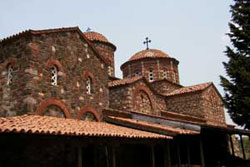
Feastday: February 14
Death: 473
Hermit and founder. The son of a Persian named Addas, Auxentius was a member of the entourage of Emperor Theodosius II in Constantinople. He retired from military service to become a hermit at Mount Oxia near Constantinople. He was accused of heresy by the Council of Chalcedon but cleared himself. He then went to Mount Skopa, near Chalcedon and attracted many disciples to his hermitage. Auxentius also formed a congregation of women on Mount Skopa.
| This article needs additional citations for verification. (April 2020) |
 Auxentius portrayed in Menologion of Basil II
Auxentius portrayed in Menologion of Basil II
Auxentius of Bithynia (Greek: Αὐξέντιος Βιθυνίας)) was a hermit born circa AD 400 in Syria, and died February 14, 473, on Mount Scopas.
Life
Born in Syria of Persian ancestry, Auxentius served in the Equestrian Guard of Byzantine Emperor Theodosius II, but left to become a solitary monk on Mount Oxia near Constantinople. His isolated hermitage was discovered by shepherds seeking their sheep, and people who were ill began to come to Auxentius for healing.
In 451 he attended the Council of Chalcedon. Afterward he returned to his hermitage atop Mount Scopas, in Bithynia, not far from Chalcedon. The hill is thickly wooded and no remains from the late Roman period have been identified. Auxentius died about the year 470.
He is not to be confused with Saint Auxentius of Mopsuestia (d. 360), bishop and martyr, and an Eastern Orthodox and Roman Catholic saint, Auxentius of Milan (d. 374), bishop of Milan, or Auxentius of Durostorum.
Auxentius of Bithynia is venerated as a saint in the Eastern Orthodox Church, Byzantine Catholic, and Roman Catholic Churches. His feast day is February 14.





